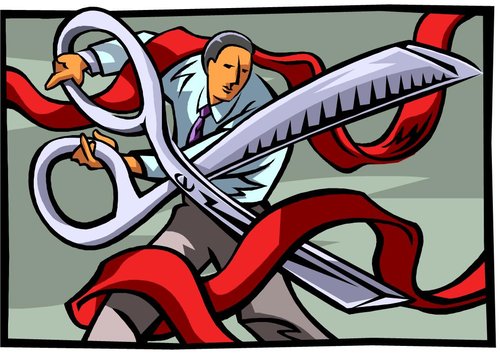Standards, Regulations & Trade
Friday, 24 February 2023By Chris Yapp

Anyone with a background in technology becomes aware of the complex interaction between standardisation and innovation. Standardization can be a stimulus to innovation but also a significant barrier. The Virtual keyboard of the iPAD on which this is being written is QWERTY, a standard developed for the days of the mechanical typewriter, dating back to 1878. The reason behind the initial development is long gone, but it was only with the development of small form factor mobile devices that any alternatives achieved market traction.
Nokia grew in the 1990s into a global telecoms giant on the back of European wide standardisation of 2G technology by ETSI.
Standards battles have a long history in technology wars. Betamax vs VHS in video and HDD vs Blu-ray later are good examples of winner takes all. Some standards have many millennia behind them, such as the foot as a unit of size.
Sometimes, we accept past norms without questioning them. Kevin Kelly in his book, “What Technology Wants”, illustrates many of the issues we have faced. The notion of 'path dependence', that today's decisions are constrained by prior decisions, can be powerful in limiting our horizons of what is possible. One of his amusing examples, explained here, even if contestable is helpfully thought-provoking.
Standards play an important underpinning part in the modern economy and particularly in the area of regulation. Not all regulations are the same. Some, such as a cap on bankers bonus, are essentially political and decisions are essentially around priorities. Others, however, have real impacts that are weakly captured, in my opinion, in economic modelling.

Abolishing EU regulations is argued by some as wholly beneficial with significant boosts to trade, investment and innovation. Regulations based on standards however need a much more nuanced approach than simply abolition. We have the standards themselves, the regulations that deploy those standards and then the conformance testing and enforcement functions to consider.
I welcome Michael Gove’s acknowledgement that Government failures on Grenfell are part of the tragic outcome . His nuanced acknowledgement demonstrates the role that updating regulations, and enforcing them, has as part of the mix. The idea that abolishing all regulations would provide an economic boost without downsides is ideological, not practical. It would be a brave soul who would argue that removing all regulations would have prevented Grenfell.
For example, the argument that one of the Brexit Freedoms is that we can abandon outdated EU regulations on transport needs unpicking. In the UK-EU TCA both parties commit to UNECE standards. That is important because the supply chains for the automotive industry mean that companies can source with confidence from suppliers in many countries. The EU is not the standards body and has subcontracted, in effect, to UNECE.
Yet outside the EU the UK is now free to set its own regulations and conformance requirements based on the same standards. That means costs for the UK market and costs for EU markets where once there was only one set of costs. Aircraft safety, road safety, food security and many other sectors face challenges that have both similarities and sectorial nuances. The UK implementation of REACH, for chemicals is one of the more complex and expensive exercises. The Transition from EU to a UK regime is complex and time consuming. GDPR is another area where there is more heat than light.
It is the move from EU CE to UKCA that fits my background most closely and it is here that I want to explore the issues of path dependency that are missing from the economic arguments over deregulation as an economic good. The FS Club has a useful primer on the potential supply chain issues here.
One of the more complex areas is in medical devices. Dates for full implementation of the UKCA regime keep retreating into the distance and become increasingly complex. What is covered by what regime requires a grasp of detail beyond me. There is a cut-off date, and devices approved before that date are still marketable under grandfathering rules. UK organisations will not be able to offer CE testing and vice versa.
I was asked sometime ago to input to a model for 'wargaming' the impact of divergence on medical electronic devices. The guidance has changed on a number of occasions since, so keeping up is itself a costly exercise. To understand this, look at gov.uk here.
The following is a composite example based on high end medical electronic devices starting at around £200K.
Currently, there are around 10 global suppliers of note with around 8 active in Europe at any one time. Four have active presence and market share in the UK. All the products are available with CE marking. In the product range there are around 30 components that themselves have CE marking. Around 25 are used in many market sectors and have starting costs from £30. A further 5 are higher end costing up to £50K and tailored or unique to the specific market. The UK currently has capacity for delivering around 5 of the components, but supply to medical electronics is very small.
The product ranges have a lifetime of 5 years and the devices themselves are supported for 10 years. The expectation would be that during the useful working life that 1-3 cheaper components and 1 high end would be needed for effective maintenance.. Among the cheaper, more commodity, components items may be replaced during the range’s commercial life. Here 2-5 years would be the planning range.
Consider what happens after the cut-off date. Within 2 years a CE component costing less than £100 may be replaced in the EU market. Will there be a UKCA replacement available? What happens if there isn’t? Does a £200K+ machine become unusable because there is no UKCA product? The Government has suggested that for goods on the market spare parts will be exempted, but this reduces the pressure or need to create UKCA registered products. This confusion could mean that UK suppliers will be at a disadvantage in their home market. Also, where the CE regulations are updated, the UK will find itself aligned even if it chose to diverge.
So, does this create an opportunity to manufacture more than 5 components in the UK? The challenge is that to be price competitive that 80%+ of the output would need to be exported, which would mean that it needed to be CE certified. At that level given equivalent costs for certification UKCA products manufactured in the UK would be more expensive than UK manufactured CE products, though they would need to be certified overseas
The standard models for trade are 'gravity' models which shows that trade is still most intense with neighbours. The recent moves against globalisation by the US Inflation Reduction Act and potential retaliation by the EU and others makes 'borderless trade' a distant prospect, especially after the Ukraine invasion.

My argument here is that standards themselves have their own gravitational pull and with it the regulatory apparatus over them has costs of divergence that are difficult to capture in a model.
So what happens after divergence? Consider my example above with 4 companies in the UK market. A has 40%, B Has 30%, C 20% and D 10%. All now need UKCA marking. The costs will broadly be the same regardless of market share. The effect of divergence gives benefit to the largest incumbent as they can spread costs over a larger market share. So, the likely scenario is the withdrawal or consolidation of supplier with lower market shares.
The main argument for widespread deregulation is that it is pro competition and innovation, yet here it is likely to lead to greater consolidation.
I apologise for what is a dense post, but the devil really is in the detail and I’ve kept this simpler than I could have.
Moving away from technical standards, I could argue that standardisation has facilitated globalisation. Visa and Mastercard are de facto global standards, though potentially under challenge from Fintech. Look 20 years out, will we see the dominant players today reinvent themselves, or be replaced by new titans, or a world with 100 competitors in the space? Your guess may be better than mine.
It can be argued that emerging industries will invent their own rules and that new regulatory frameworks will be needed and emergence in due course. History does support that as a line of argument. So, if you wanted to invest in say an AI game changing enterprise, would you invest in the UK, EU, Asia or the UK?
Go back to my earlier example of Nokia and 2G. It’s explosive growth in the 1990s was based on European-wide standardisation, not Finish divergence or exceptionalism.
It’s not that I am against deregulation. There are some/many poor examples and there are many areas where reform could help. My concern is that there are many types of regulation and the arguments in different sectors need to be understood in nuanced detail. In a debate, I would argue for cooperation more than I would for divergence as a way forward. We have had 40 plus years where 'deregulation' was the answer whatever the problem was. I’m not convinced that the evidence supports that going forward.